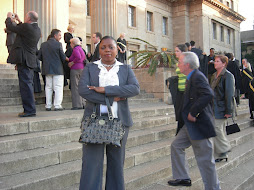The challenge of world competitiveness: Western versus Afrocentric perspective
I have been challenged by some issues that were raised by Mr. Kuseni Dlamini (CEO of Richards Bay Coal Terminals, and upcoming CEO of Anglo-American from July 2008) during his presentation on “Lessons for Emerging Leaders in a Rapidly Changing Environment”, on the 14 of April, at “World of Work Training and Internship Programme” held at Wits University. During the ‘questions-answers’ session, Dlamini asked the audience: “What the world would lose if Africa disappeared?” Put in other words, the question asked “what Africa has brought to the World?” Dlamini was very specific and realistic: “Africa is the only continent in the World which did not yet design a car, while Africans are proud of driving in big cars, such as BMW, Mercedes, Jaguar, etc. as it were Brazil, India, and Malaysia can compete globally in the automobile industry because they have designed their own brands”. Dlamini concluded his presentation by inviting us as future African elite and leaders to invest in knowledge and to be competitive like our colleagues of the US or UK by getting two or three PHDs and by publishing books and articles because this is the challenge of the world competitiveness.
Even if this is an irrefutable fact, I felt that the way Dlamini translated his views was somewhat Western-oriented by emphasising on the negatives of Africa. I tried to find out if beyond this reality there is any fallacy or any racial ideology at work. Three articles have inspired me to adjust Dlamini’s points. All come from a black American scholar, Dr. Molefi Kete Asante of Temple University (Pennsylvania), one of the pioneers of Afrocentricity (www.asante.net)
From a Europecentric point of view, Huntington claimed (p. 81, quoted by Molefi Asante in “Afrocentricity…”) that the West
• Owned the international banking system
• Controlled all hard currencies
• Provided the majority of the world’s finished products
• Exerted moral authority over other leaders
• Was capable of massive military intervention
• Controlled the sea lanes
• Conducted most advanced technical research
• Dominated access to space
• Dominated aerospace
• Dominated international communications
It appears that Africa is totally absent from the history of Humanity (Hegel). Why? Are there any contributions from Africa in the history of the World? The question does not exist in the western discourse; yet, Africa has played a central role in Science, Art, Religion, and Politics in the History of Humanity. How many Africans are aware that Imhotep, the father of architecture, was an African? He built the first masonry structure in history (Asante). Hatshepsut was the first queen to rule in her own right with authority in the world. (Asante). Unfortunately, “Africa has been betrayed by education, the Academy, and the structure of knowledge imposed by the Western world; Africa has often been betrayed by its own leaders who have shown a talent for imitating the worst habits and behaviors of Europe; Africa has often been betrayed by the ignorance of its own people of its past” (Asante, in “Afrocentricity…”).
During the past centuries, the western world has constructed a system of knowledge’s ownership and control. Fences have been created to keep others away from knowledge, property reserved for a few. “But this reservation of knowledge is motivated by the quest for domination” (Asante). Actually, “we are tied to a system of injustice that makes it possible for rich nations to make knowledge or the access to knowledge difficult for poorer nations” (Asante). “Those who own knowledge do so not because they are smarter or more ambitious, but because they are more aggressive and capable of employing more force. Much of the knowledge is not their own knowledge, it is borrowed, rented, stolen, but they have created the mechanisms of access. Thus, you must find the ways to access it for your own use if you are in the game; otherwise you remain outside of the arena of knowledge that affects the world. Right now, African nations and African peoples are on the verge of being shut off from the storehouses of knowledge. This will happen more and more with the development of more computer technology. We will be able to see the Internet, superhighway, but we will not be able to ride it” (Asante).
The European Union has set up its vision for the next 20 years as follow: “to be knowledge centre of the world in the next 10-20 years”.
Again, the system is far from being stopped. As intellectual Africans, future elite and leaders of the continent, our task is to struggle for a democratization and decentralization process of knowledge so that no human being can be denied access to information; no matter his/her social background. We need to develop a culture of intellectual activism for that objective.
Saturday, May 10, 2008
Subscribe to:
Post Comments (Atom)





No comments:
Post a Comment